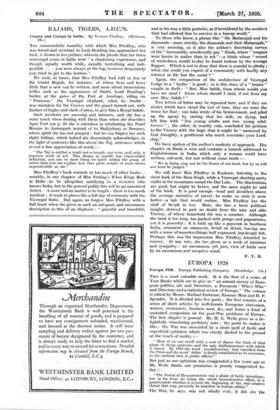RAJAHS, TIGERS, A.D.C.'S.
: Courts and Camps in India. By Yvonne FitzRoy. (Methuen. 166.) THE commendable humility with - which Miss FitzRoy, who was friend and secretary to Lady Reading,has approached her task,. is shown in her preface, wherein she pleads that her three semi-regal years in India were " a chastening experience, and though signally worth while, signally_ tantalizing and indi- gestible . . . you were always at the top, however desperately you tried to get to the bottom."
We wish, at times, that Miss FitzRoy had told us less of the Grand Moguls, for instance, of whose lives and loves little that is new can be written, and more about tremendous trifles such as the appearance of Smith, Lord Reading's butler, at the gates of the Fort at Amritsar, riding on " Primrose," the Viceregal elephant, when he— Smith-- was mistaken for the Viceroy and the guard turned out, with fanfare of bugles and clash of arms, to give him a Royal Salute.
Such incidents are amusing and intimate, and she has a surer touch when dealing with them than when she describes Agra Fort (on p. 35 she is mistaken in attributing the Pearl Mosque to Aurungzeb instead of to Shahjehan) or Benares, whose spirit she has not grasped ; but we can forgive her such slight failings, which indeed she disarmingly acknowledges, in
the light, of sentences like this about the Taj, sentences which reveal a fine appreciation of words :— " The Taj is neither a tomb nor a temple, nor even, and only, a supreme work of art. This dream in marble has transcended definition, you can no more bring its spirit within the grasp of saints than you can explain how that great weight of stone seems imponderable as air.
Miss FitzRoy's book reminds us too much of other books— notably, in one chapter, of Miss Festing's When Kings Rode to Delhi—to be altogether satisfying to a reviewer who knows India, but to the general public this will be an unnoticed defect. A more serious matter is its length : there is too much
• incident ; it reads in places like a full day of ceremony with the Viceregal Suite. But again, we forgive Miss FitzRoy with a ' full heart when she gives us such an adequate and uncommon description as this of an elephant : " graceful and beautiful,
and in his way a little pathetic, as if bewildered by the accident that had allowed him to survive in a teacup world."
To those who know, a phrase like " the Maharajah and his diamonds—more strictly, the diamonds and their Maharajah," is very amusing, as is also the author's discerning survey of the " incessantly, unrelievedly gay " Simla, where " tongues were busier in malice than in wit "—a Simla whose " record of wickedness would to-day be found tedious by the average flapper. Which is not to deny that there is scandal in plenty ; what else could you expect of a community with hardly any interest in life but the social ? "
Again, the comparison of the architecture of Viceregal Lodge to a " hydro " is good : so is this story of a " bearer " caught in theft : " But, Miss Sahib, from whom would you have me steal ? From whom should I steal, if not from my own Miss Sahib ? "
Two letters of babus may be repeated here, and if they are stories which have stood the test of time, they are none the worse for that ; one babu wrote of his bereavement, and piled up the agony by stating that his wife, on dying, had left him with " five young adults and two young adul- tresses " ; the other, in courtly vein, concluded his petition to the Viceroy with the hope that it might be " answered by God Almighty, a gentleman who much resembles your Lord- ship."
We have spoken of the author's modesty of approach. Her chapter on Simla is wise and contains a remark addressed to Englishwomen in India which only a woman could have written, sub-acid, but not without some truth :—
" We in India, may not be the flower of our kind, but by us will our kind be judged."
We will leave Miss FitzRoy in Kashmir, listening to the short bark of the Bara Singh, while a Viceregal shooting party stalks in the mountains round the Dal Lake. The illustrations are good, but might be better, and the same might be said of the book. It is good enough—head and shoulders above the average narrative of travel—to make us wish it were better—a talc that would endure. Miss FitzRoy has the stuff of Sa'adi in her. More, she has a keen political insight, derived in part no doubt from the wise and able Viceroy, of whose household she was a member. Although the book is too long, too packed with pomps and pageantries, yet it is powerful ; it is built up like a gopuram in Southern India, ornament on ornament, detail on detail, leaving one with a sense of nameless things half expressed, but deeply felt. Perhaps this was the impression Miss FitzRoy intended to convey. At any rate, she has given us a work of intuition and sympathy : an uncommon, yet just, view of India seen by an uncommon and receptive mind.
F. Y. B.






















































 Previous page
Previous page